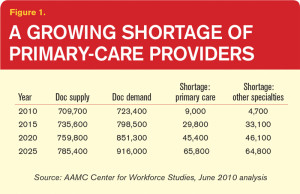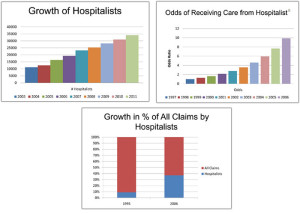Category: Testimontials
Direct Primary Care: A Medical Students Perspective
As the end of our first year of medical school approached, we received our assignment for where we would complete our primary care apprenticeship for the following year. After the countless hours of studying in isolation, we would finally be fully emerged in a setting to interact with patients and be able to put a face to the multitude of diseases and medications that we spent learning in the prior months. Before our first day at Gold Direct Care, we only had our own experiences as patients as well as the opinions- both positive and negative- from doctors and upperclassman to guide our perceptions of what it would be like to be a primary care physician. Among opinions of fellow classmates, rarely would we hear, “I want to be a primary care doctor.” As for physicians, a compilation of their opinions illustrated the picture of the primary care physician as a half assembly line worker and half paper pusher. Furthermore, in order to provide the best possible “patient centered care,” there were certain rules set by administrators and insurers. Everyday you will see 26 patients. For each appointment, you have 15 minutes to obtain an accurate and complete history and physical exam, strengthen the doctor-patient relationship by establishing rapport and find the time to teach medical students and residents. And the reward for successfully juggling all of these tasks is a stack of endless paperwork waiting to be completed.
As we walked through the doors on our first day, the dreaded barriers that we envisioned were nowhere to be found. In fact, we quickly learned that Direct Primary Care (DPC) and Dr. Gold operated by a different set of rules. There was no time limit for each appointment and the length was determined by no one other than the patient. Thus, there was not only more than sufficient time to address all of the patient’s wants and needs, but also to establish a strong rapport in order to strengthen the relationship between the two most important people in healthcare, the doctor and the patient. Since Dr. Gold never had to worry about a stack of paperwork, he was able to reallocate that time towards teaching. Specifically, we had the opportunity to interview every patient, perform a detailed physical exam and properly document the encounter while being supervised and guided by Dr. Gold in order to maximize every learning opportunity. While these may just seem to be unique characteristics of Dr. Gold, it is the environment created by DPC that allows great people like Dr. Gold to be great doctors to their patients, as well as great teachers to their students. After our experiences working at Gold Direct Care, the negative picture of primary care that we originally envisioned had transformed into one that any current or future doctor would desire.
With a desperate need to attract more medical students into primary care, students are still reluctant to pursue careers in primary care. Dr. Gold and DPC offer solutions to this problem. Doctors can practice medicine the way it ought to be practiced, which is solely focused on the doctor and the patient. Instead of working for an insurance agency, you get to work for your patients, who will ultimately determine your value. No more paper pushing, no more assembly line, just the doctor and the patient working together to improve health outcomes- a recipe that will make primary care a very attractable career path for medical students once again. After arranging an information session for Dr. Gold to share the benefits of DPC with our class, it was quite evident that we were not alone with our enthusiasm regarding DPC. In fact, shortly after its conclusion, a fellow student sent us a text “Guys, I think I want to do primary care now!”
Thank you to Dr. Gold and Meghann for this incredible learning experience. Everything you taught has been invaluable and will help shape our future careers in medicine. Also we would like to thank all of Dr. Gold’s patients for allowing us to learn through hands on experience and giving us advice that will help improve our abilities as future physicians.
Michael Held & Douglas Rodgers
Tufts Medical School Class of 2018
It Was the Best of Days and the Worst of Days
Last Wednesday, January 6 2016, was a day I will not forget any time soon. It was a day that showed me the worst of our healthcare system but also the best. The week prior, a new patient enrolled with us online. His name was not one that was familiar to me. We scheduled him for a full checkup the next week. Patient X is a 29 year old male chef that found me online because he had no health insurance and was looking for an affordable entryway into our healthcare system. He had applied for Medicaid but was waiting on confirmation. He is a hard working, honest guy that could not afford to purchase any of the “affordable Obamacare plans” on the exchange. Luckily, he did qualify for subsidies to get MassHealth but he was not confirmed at the time of our visit. For this, I will thank Obamacare. It is not bad in every way.
After my nurse put him in the exam room and got some information on him she came back to my office to tell me about the multitude of symptoms he had been having for the past 4-6 months. These symptoms had worsened over the past few weeks and finally prevented him from working. These symptoms included left sided headache with blurred vision in his left eye, bilateral hip pain, back pain, some weight loss, and an enlarging lump in his testicle which he attributed to an enlarging benign cyst that was diagnosed by another physician years prior. Clearly he was anxious and you know what? So was I.
As I entered the exam room I was greeted by a tall, slender and very personable young guy. We walked through the details of his symptoms and the time course. I encouraged him to relax and take his time since with Direct Care there is happily no more rushing through the mill. Needless to say his story was very concerning to me and it was amazing to me that this guy was able to perform labor up until two weeks prior, especially since the pain was keeping him up at night. After his history, I conducted a thorough head to toe exam. He only had minimal neurologic findings. When he was lying down so I could examine his abdomen I could see a large left sided mass in his groin under his shorts. Sadly, all the worst-case scenarios that were running through my head were now close to being confirmed. As he stood up and lowered his shorts I was presented with the culprit- a large left sided testicular mass with swollen nodes in his groin- i.e. it had already spread and now I was concerned that all his other symptoms were manifestations of the same. This was not an easy conversation to have but I sat with him and relayed my concerns.
So the first worst part of the day was seeing this guy suffer with awful symptoms for so long without engaging our system. Was it fear of illness that kept him away? Fear of cost? Denial? Truthfully it was probably a combination of all of the above. The hard part for me was seeing the regret on his face. I tried to reassure him that what is done is done and we can not go back in time, but that we need to deal with the here and now and move forward. And so we did.
So now for the best part of the day. Within 20 minutes our wonderful insurance broker, George Claassen, came over to the office to meet with Patient X and get his insurance confirmed, as I knew he would be heading for extensive and expensive treatment- the stuff for which insurance should be used. While he met with George, I was on the phone with a great local urologist who agreed to see the patient that afternoon and was willing to do a cash price for him if needed. Following his visit the patient called me and told me it was advised that he would need CAT scans the next day prior to urgent surgery that was scheduled for Friday AM. Thank god we got him on insurance right?
That is until he told me that his new Medicaid plan would not cover the CAT scans- CAT scans ordered by a specialist with years of experience that is CONTRACTED with MassHealth!- the second worst part of the day. He was told by the schedulers at the hospital that the order needed to come from a MassHealth PCP! What planet am I on? A specialist nor an MD who diagnosed his condition can’t order an outpatient scan because of what?… Bureaucracy of course. I will not bore you with more details as the situation ended up working out and he got his scans the next day- which sadly showed spread of disease to bone, brain, nodes etc- and he had surgery last Friday. He is now in the hospital with a long arduous road ahead while he awaits chemotherapy. His pain is under better control and all we can do now is hope that his strong constitution and will to get better will guide him to being fully cured. But did he really need the two hours of aggravation after being told he had bad disease?
So like I said…it was the best of days and the worst of days all wrapped into one. It glaringly showed the positives and negatives of our system in the USA. All I hope for is the “best of days” when I can say that Direct Primary Care- for 50$ a month- saved the life of a really nice, polite, hardworking, appreciative, 29 year old year guy. It is an honor to be his doctor.
Disclaimer: this was written with the patients consent and he approved its content prior to posting.
The Primary Care Shortage: How Significant Can an Email Be?

We often read about the Primary Care shortage across the country continuing to grow, especially in states like Massachusetts that have a higher proportion of specialists. Some will argue that its exaggerated but numbers do not lie. Call a local doctors office and find out how long it takes to be seen as a new patient- provided they are even accepting new patients. Well here comes Direct Primary Care with smaller patient panels of 600-1000 patients versus the 2500-3000 of typical insurance based panel sizes, and along with it comes the critics. “You are worsening access,” we are told. Well the reason access to good primary care is poor is because the system is driving medical students- all with plenty of debt- into higher paying specialties. The system is forcing good docs to leave medicine early- whether it’s to retire early, move into administrative positions, or even go work for insurers! I argue that Direct Care can fix this by providing a professionally gratifying, financially rewarding experience so that more students like the ones I teach from Tufts will actually want to go into the field.
Take my current 3rd year Tufts medical student Ian Murphy who states: “I felt that a career in Primary Care would be rewarding but financially unsustainable and mentally draining. After being here for the past 3 weeks, I am now encouraged to look at and explore Primary Care more closely before making a career choice.”
And finally read this email from Salem resident Jennifer Kugel that I received a few months back (with her permission of course). She will be spending a day with me this week.
”
Hello,
I am a perspective medical school student looking to gain insight and experience into the world of medicine. I have an undergraduate degree in Sports Movement Science from Salem State University, and am planning to take the MCAT’s next April and apply by June.
I heard about Dr. Gold’s Direct Care initiative while listening to NPR a few weeks back. I was thrilled to hear that someone locally (I live in Salem) is trying to change the way healthcare is being run. When I got home I looked up his website and read through all of the pages and anecdotal stories. I was quite taken aback to find a doctor who was still interested in doing house-calls and practicing preventative medicine rather then dealing with problems as they come.
As with many people who want to become a doctor, I have envisioned it since I was a toddler. As I have gotten older and taken alternate paths to get my degree, I have continually asked myself why I want to BE a doctor. The answer is still simple; I want to help people. With healthcare operating the way it does, patients are not getting the attention they need, and problems are not caught soon enough. Too many decisions are based off of what people can or cannot afford, and not what is best for their life and lifestyle. To see that an established doctor wants to go out of his way to make the system work better for everyone involved is quite inspiring.
I would greatly appreciate an opportunity to shadow Dr. Gold and gain experience from someone with a vision of a better healthcare system. I am hoping that by the time I finish my medical school experience, that I may be able to take the vision and apply it to my own patient care.
Thank you for the consideration, and I look forward to hopefully meeting Dr. Gold in person soon.
Truly,
Jennifer Kugel
This…is how we actually fix the “access problem.”
DPC and Hospitalists
How does DPC help patients in the hospital? You can ask my patient quoted below or ask the Hospitalist who took care of him, but I would also like to comment on this.
There are many benefits to Hospital-based doctors (aka Hospitalists)- they are intelligent, well trained doctors and NP/PA’s and they provide 24/7 coverage if something goes wrong when you are admitted. We as primary care doctors used to practice hospital medicine as well as outpatient/office medicine, but for many reasons which is beyond the scope of this blog post, most if not all primary care doctors solely see patients in the office setting now. And there are many negatives to this which most patients who have been admitted to the hospital at some point can attest to:
- As good and caring as these doctors and NP/PAs are, they don’t know the patient like we do.
- Hospitalists often have a minimum of 10-12 patients on their census at a time some of whom may be very ill. That is a lot to manage.
- As a result of #2 and the amount of documentation and computerized order entry that goes along with it, hospitalists have very little time to call and/or email the Primary Care Physician with updates on their patients.
- This contributes to more fragmentation of care and increased costs to the system as a whole.
- Lastly, which is the worst in my opinion, is scared and confused patients.
So what does DPC do to help this? :
- We can actually come visit our patients periodically to check in and see how the hospital stay is going. The patient- like the one quoted below- gets to see their own doctor and be reassured that we are “in the loop.”
- We have more time to communicate with the Hospitalists regarding our patients histories, medication lists, social situations etc. This allows us to work in a collaborative way to ensure the patient gets the best care possible.
- I believe Hospitalists would appreciate this involvement rather than look at as us “stepping on toes.” We can provide information that the patient may not be capable of communicating or that they may not think is vital to their hospitalization.
- The end result is what healthcare should be about- BETTER OVERALL PATIENT CARE.
So here is my patients quote/review: “If U haven’t yet signed up with Gold Direct Medical Services, U R surely walking in the wrong direction! I recently had a several day hospitalization and was actually visited by Dr. Jeff Gold, and was also privy to a conference between him and the hospital doctor, to say nothing of the several daily direct calls to me in my hospital room from him. WHEN WAS THE LAST TIME YOUR DOCTOR VISITED U IN THE HOSPITAL?”
Some date on hospital medicine:
What We Strive For With DPC
One of the main reasons I decided to make this huge career change into a Direct Primary Care practice was to give patients what they deserve from their doctor….time. One of my patients that followed me from my old practice has allowed me to post this wonderful testimonial she wrote on Facebook on Friday. Many thanks to her for doing so. This is an example of what true patient and doctor satisfaction are about:
“Today I had my first official appointment with Dr. Jeffrey Gold at Gold Direct Care. It was a phenomenal experience. His new office space is beautifully decorated and comfortable. Dr. Gold spent quite awhile with me, answering numerous questions and making me feel, as he always does, at ease. Has anyone ever gone to their primary care doctor and been greeted with: “Would you like some coffee or tea?” My visit was an experience- not rushed, not pressured to hurry up. If you want a primary care doctor who sincerely cares about you and your family and is in the practice of medicine to do just that, then you have to meet with Dr. Gold and see what Direct Primary Care is all about.”
Letter of appreciation from a patient
We received this thoughtful note from a patient today. It is truly rewarding to continue relationships with patients year after year, especially in the new form of direct care.
[blockquote background=”#efefef”]
Dear Dr. Gold:
Congratulations on your new venture. I truly like the concept of your practice but most importantly, I am glad that I have the opportunity to continue to be a patient of yours. After being part of your practice since the beginning my decision to stay was an easy one. You have always provided the utmost professional and personal care and I look forward to this continued relationship.
Good Luck Dr. Gold and Meghann, I can’t think of a better team to be affiliated with. I look forward to the great care and personal touch that I have always received with you.
[/blockquote]







